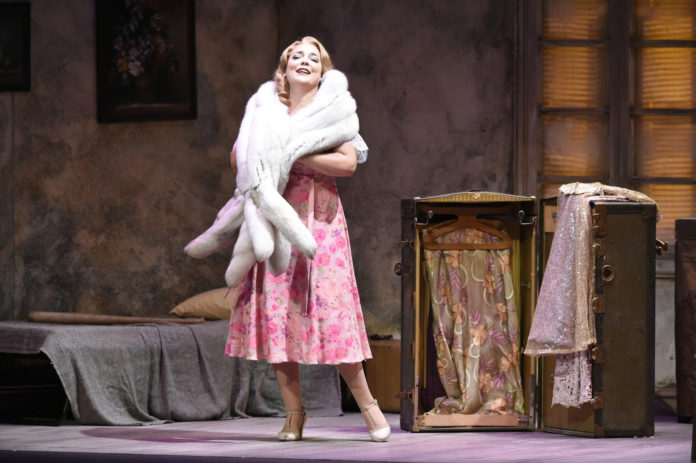|
Getting your Trinity Audio player ready...
|
Florida Grand Opera opens its 80th Anniversary Season with the new American classic based on the most operatic of quintessential American plays — Tennessee Williams’ and André Previn’s A Streetcar Named Desire.
Making its Florida premiere on Saturday, January 22, 2022, A Streetcar Named Desire features Miami’s own international opera star, Cuban-American soprano Elizabeth Caballero, in the iconic role of Blanche DuBois. Rising soprano Rebecca Krynski Cox makes her house debut as her hapless sister Stella and audience favorite, baritone Steven LaBrie, returns as the brutal Stanley Kowalski. Former FGO Studio Artist Nicholas Huff returns in the role of Harold “Mitch” Mitchell, while current Studio Artists Amanda Olea, Katherine Holobinko, Stephanie Doche, Charles Calotta, and Erik Danielson fill the supporting roles. Gregory Buchalter conducts, with stage direction by Jeffrey Buchman. The production is from New Orleans Opera Association, with costumes by Howard Tsvi Kaplan, set by Steven C. Kemp, and lighting by Don Darnutzer.
The story begins with fading Southern belle Blanche DuBois, who arrives at her sister Stella’s shabby New Orleans tenement with a trunk filled with feathered finery and deeply closeted skeletons. Desperate to avoid facing reality, Blanche quickly clashes with Stella’s working-class husband, Stanley, who unravels her secrets and, in an act of stunning brutality, destroys what is left of her slipping sanity.
Stage director Jeffrey Buchman says that the story is challenging, but perhaps not in the way people think. “Throughout A Streetcar Named Desire Named Desire, Williams defies us to define his characters as either good or bad, admirable or despicable, whole or broken,” he says. “They are all deeply flawed, and like onions, we peel back the layers on their world as the show progresses … And with a greater empathy for the circumstances that may have created or brought out these flaws in each of them, we are faced with the challenge of how we will judge them.”
Previn’s jazz-flavored, cinematic score only heightens Williams’ taut psychological drama. “You can hear the streetcar in the music,” says conductor Gregory Buchalter, adding that the opera follows the play almost precisely. “In the opening chords, you can hear the streetcar’s horn. Previn’s work influences the score as a film composer and as a great jazz pianist and arranger. A special jazz component frequently plays independently of the orchestra for dramatic effect. Previn sometimes deliberately creates dissonance in dramatic moments. There are other places where it’s so tonal, almost Puccini-esque. He creates the music very well in terms of the characters.”

The transformation of the iconic play to an equally iconic opera is an interesting one. Over the years, many critics have noted the operatic quality of A Streetcar Named Desire’sdrama. It has been adapted into several ballets and a musical. However, Williams was resistant to operatic treatments of his works. He was approached many times over the years but only opened his catalog twice during his lifetime: once, for his one-act Lord Byron’s Love Letter, and once to the composer Lee Hoiby, who chose to set Summer and Smoke. After several years of negotiation, Williams’ estate granted rights for A Streetcar Named Desire to San Francisco Opera, where the work premiered to great acclaim in 1998. André Previn, a renowned classical musician, conductor, and composer equally acclaimed as a film composer, jazz pianist, and arranger, undertook what might be considered less an adaptation than a grand expansion of the original play. From the ever-present rinky-dink blues piano to the increasingly sinister “Varsouviana” folk dance that repeats in Blanche’s head, the music is critical to the play, almost a character in itself. It’s as if Williams imagined a cinematic underscoring, and years later, Prévin delivered.
A Streetcar Named Desire also has an unusual connection to Miami. In 1956, less than ten years after his play made its debut and won the Pulitzer Prize, Tennessee Williams staged a revival at the Coconut Grove Playhouse (then the Coconut Grove Theatre), under the direction of Herbert Machiz and starring Tallulah Bankhead, the actor for whom Blanche DuBois was written. However, Williams and his cast — especially the tumultuous Ms. Bankhead — soon clashed, and he removed to Key West, one of his favorite retreats.
The play ran for one month and then returned to New York for additional dates. No word on whether Williams accompanied the troupe; however, the experience did not sour him on South Florida. He was known to hang out in Coconut Grove among other artists and free spirits who espoused a bohemian lifestyle, and in recent years, local art museums have hosted showings of his little-known paintings.
“We are proud to begin our 80th Anniversary Season with an offering that is both an American classic and a contemporary treasure,” says Susan T. Danis, Florida Grand Opera’s General Director and CEO, who is also celebrating her own 10th anniversary at the company’s helm. “It aligns with our mission to produce diverse, culturally engaging experiences both in the theatre and the community. Anyone can, and is invited to enjoy a work like A Streetcar Named Desire, and we hope they will.”
For more information, please see www.fgo.org.
PERFORMANCE SCHEDULE
MIAMI | Adrienne Arsht Center for the Performing Arts of Miami-Dade County / Ziff Ballet Opera House






